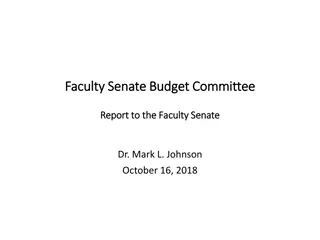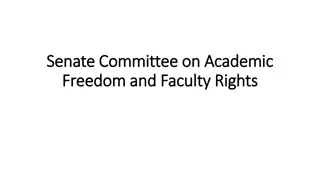Senate Committee on Student Discipline: Appeal Process Training
The Senate Committee on Student Discipline deals with disciplinary procedures, appeals, and recommendations for suspension or dismissal. The appeal process assesses procedural fairness and sanctions, with specific deadlines and guidelines for appellants. Appellate review involves committee meetings based on availability and case materials to decide on appeals.
Download Presentation

Please find below an Image/Link to download the presentation.
The content on the website is provided AS IS for your information and personal use only. It may not be sold, licensed, or shared on other websites without obtaining consent from the author.If you encounter any issues during the download, it is possible that the publisher has removed the file from their server.
You are allowed to download the files provided on this website for personal or commercial use, subject to the condition that they are used lawfully. All files are the property of their respective owners.
The content on the website is provided AS IS for your information and personal use only. It may not be sold, licensed, or shared on other websites without obtaining consent from the author.
E N D
Presentation Transcript
Senate Committee on Student Discipline: Appeal Process Training Bob Wilczynski September 11, 2023
Review of SCSD Duties The Committee shall: Appoint members of the subcommittees on student conduct; Establish, maintain, and revise (as necessary) the Student Disciplinary Procedures, which specify the process by which university disciplinary officers and the subcommittees on student conduct address alleged violations of the Student Code; Hear appeals of subcommittee on student conduct decisions; and Hear recommendations for suspension or dismissal arising from an academic integrity infraction.
Appeals Appeals are assessments of the subcommittee s performance (and/or that of OSCR staff, the Title IX Coordinator, etc.). Were procedures followed? Was the hearing conducted fairly and without bias? Were the sanctions appropriate? Has some important new information emerged that the subcommittee didn t have? Appeals are NOT a second bite at the apple for the appellant.
Appellant Expectations Deadline: five business days from the sanction letter Notice of Appeal Identify specific grounds Identify relief requested Provide rationale for the above Subcommittee actions are held in abeyance until the appeal process is concluded (with the exception of some behavioral expectations, e.g., no contact directives).
Appellate Review You will be selected to serve on an appeal committee based on your availability. Appeal meetings are scheduled either as needed or in preparation for likely appeals. At some point after being appointed to an appeal committee, you will be given access to the case materials via Box. Even if you plan to do a thorough review later, please scan the case materials as soon as possible to determine whether you have a conflict of interest or bias and need to be replaced. In most cases, you will meet with your fellow appeal committee members and your advisor at the designated time and either (1) decide the appeal based on the case materials and your deliberation, or (2) determine that an in-person appeal hearing is necessary before you can decide the appeal (ultimately up to the chair/designee). In some cases, the chair will already have determined that an in-person hearing is necessary. If so, you will be told in advance. [2 is not an option in Title IX cases.]
Ground 1: Procedural Error Procedural irregularity that affected the outcome of the matter.
Ground 2: New Information New evidence that was not reasonably available at the time the determination regarding responsibility was made, that could affect the outcome of the matter.
Ground 3: Conflict or Bias The CC or Panel members had a conflict of interest or bias that affected the outcome of the matter.
Ground 4: Inappropriate Sanctions Any sanctions imposed by the CC or Panel were not appropriate for the violation(s) for which the respondent was found responsible. Sanctioning Guidance Did the subcommittee err by following guidance? Did the subcommittee err by deviating? The question is NOT whether you would have imposed the same sanction(s), but whether the subcommittee was out of line in imposing the one(s) that it did.
Appeal Hearings (In-Person/Live) Before the Hearing Review all relevant materials, including the recording of the original hearing. (Box) Ask questions of the chair or and/or advisor. Address any procedural issues or concerns. Beginning of Hearing Introduce yourself by name and role (chair, student voting member, faculty voting member) Challenges to objectivity (if not already addressed) Identify others present (case coordinator, advisor, etc.) Overview of hearing process
Appeal Hearings (In-Person/Live) During the Hearing Appellant s appeal rationale (10 minutes max) Appeal Committee questions the appellant Panel Chair s rationale and comments Case Coordinator s comments Appeal Committee questions the Panel Chair and the CC Open questioning period under the direction of the Chair Appellant s Final Statement (The appellant should always have the last word.)
Appeal Hearings (In-Person/Live) Deliberation Determine if any of the grounds for appeal have been met. Determine if any changes should be made to the original decision. Changes require a simple majority. Otherwise, the original decision is affirmed. Communication of Decision Appellant returns to hearing to hear the decision; and/or A detailed letter is then emailed to the appellant.
SCSD Review of Title IX Decisions Two decisions are subject to appeal: the decision of the investigator to dismiss a formal complaint (or any allegations therein) AND the decision of the subcommittee panel There is no formal hearing option, only a review of the materials and a meeting with an OSCR advisor. The decision is communicated to the parties by OSCR staff.
Possible Actions Affirm the decision, at which time the matter will be considered final and binding upon all involved. Modify the decision, at which time the matter will be considered final and binding upon all involved. Remand the case to the original hearing body (with instruction) or to a new hearing body (with or without instruction) for a new decision. Modify any sanctions or restrictions imposed,at which time the matter will be considered final and binding upon all involved.
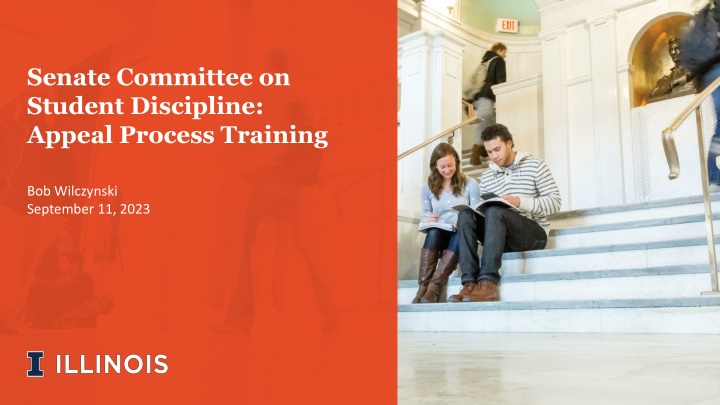

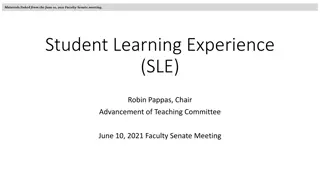

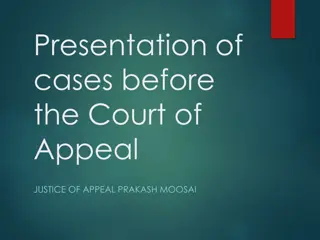
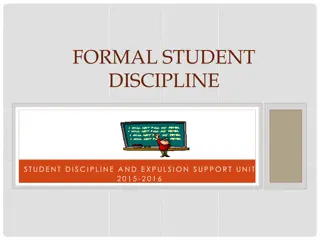
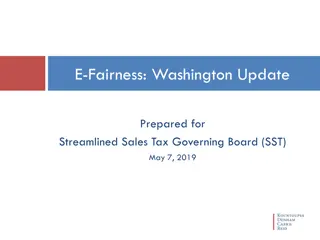
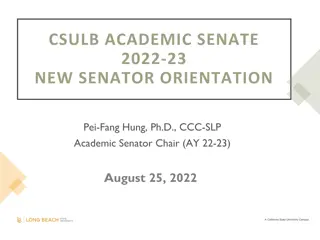
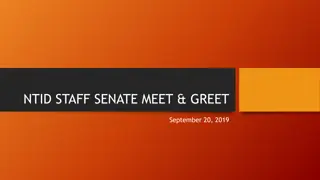
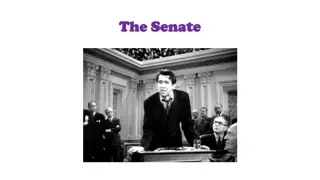
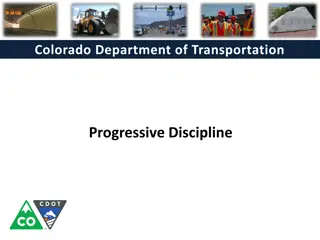

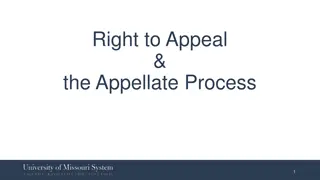

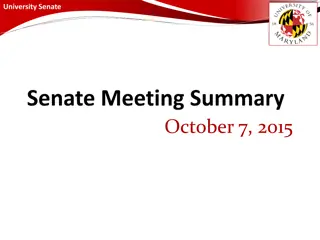
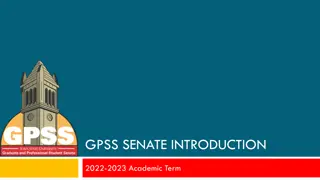
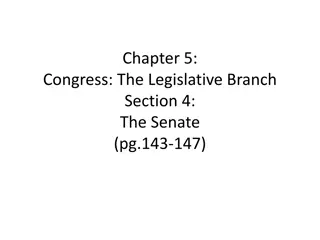
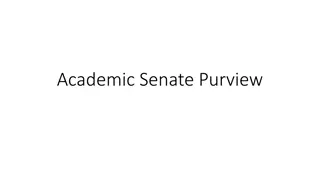
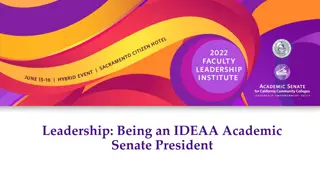
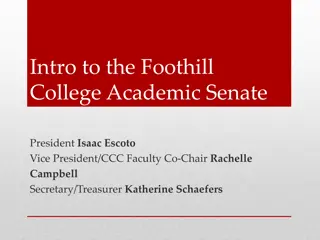
![Overview of the Faculty Senate at [Institution Name]](/thumb/233771/overview-of-the-faculty-senate-at-institution-name.jpg)
